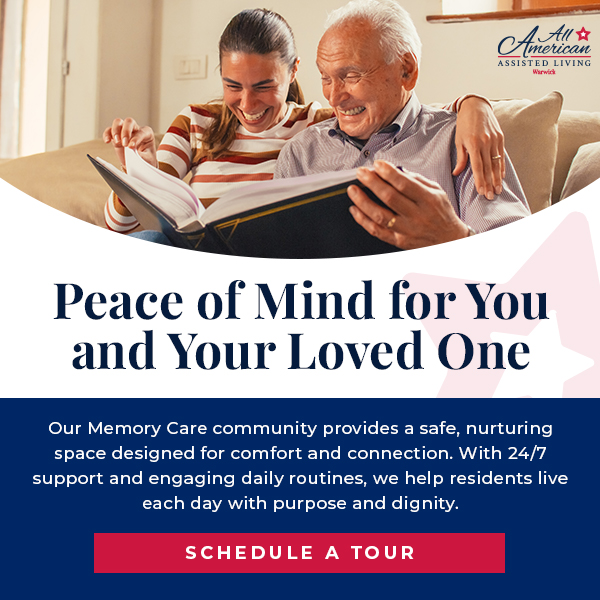Key Takeaways
- Reminiscence therapy uses memories and life stories to support seniors in memory care.
- Sharing past experiences improves mood, self-esteem, and connections with others.
- Activities include music, photos, storytelling, and sensory engagement.
- Memory care communities in Warwick offer programs designed to promote comfort and a sense of belonging.
The Power of Reminiscence Therapy in Memory Care Programs
Reminiscence therapy is a structured approach that encourages seniors to recall and share their past experiences, often through the use of photos, music, or storytelling. For those living with Alzheimer’s disease or other forms of dementia, these conversations can provide comfort, spark recognition, and promote joy.
Rather than focusing on recent memory—which may be challenging—reminiscence therapy emphasizes long-term memories, allowing seniors in memory care to celebrate the lives they have lived and maintain a strong sense of identity.
Why Is Reminiscence Therapy Effective for Seniors?
Reminiscence therapy works because it taps into the part of the brain that often stays intact longer, even as dementia progresses. By connecting with meaningful moments, seniors can experience:
- Improved mood and reduced anxiety through comforting memories
- A stronger sense of identity by recalling personal achievements and milestones
- More social interaction when stories are shared in a group setting
- Greater self-esteem as they feel heard and valued
This type of therapy doesn’t just stimulate memory—it builds connection, which is at the heart of memory care.
What Makes Reminiscence Therapy Different from Other Activities?
Many senior living communities offer general recreational programs like exercise, crafts, or games. While those are valuable, reminiscence therapy is unique because:
- It focuses on the personal past rather than current events.
- It provides emotional healing by honoring life experiences.
- It strengthens identity and dignity, especially for those struggling with memory loss.
By centering activities around who a person is and where they come from, reminiscence therapy ensures care is truly person-centered.

How Does Reminiscence Therapy Improve Quality of Life?
Boosting Emotional Well-Being
Engaging with familiar stories and images can reduce stress and help calm frustration. A favorite song or old photograph can quickly shift a mood, bringing laughter or smiles even during difficult days.
Encouraging Social Bonds
Group reminiscence sessions often inspire conversation between residents. As one person shares, others may recall similar memories, creating a sense of camaraderie and belonging.
Supporting Cognitive Stimulation
While dementia affects memory, the act of recalling and talking about the past still exercises the brain. This stimulation helps slow decline and maintains pathways for communication.
Examples of Reminiscence Therapy Activities
Reminiscence therapy can take many forms, and the best activities are those that spark personal connections. Some popular approaches include:
- Music therapy: Playing songs from a resident’s youth or cultural background.
- Photo albums and memory boxes: Personal items that bring back familiar feelings.
- Storytelling and conversations: Guided sessions where residents share life experiences.
- Sensory activities: The smell of a favorite food or the feel of familiar fabric can unlock powerful memories.
- Movies or shows from the past: Watching old films or TV programs can prompt discussion and nostalgia.
Each activity is flexible and can be adapted to suit individual preferences, making the experience personal and meaningful.
How Families Can Support Reminiscence Therapy
Families play a vital role in helping reminiscence therapy succeed. You can support your loved one by:
- Bringing personal items: Photos, recipes, or keepsakes to spark conversation.
- Joining group sessions: Sharing stories together strengthens family bonds.
- Listening with patience: Allowing your loved one to speak without correction encourages confidence.
- Asking open-ended questions: Prompts like “What was your favorite holiday tradition?” help guide memory sharing.
Participating in these activities not only comforts your loved one but also helps you connect more deeply during visits.
Why Memory Care Communities Use Reminiscence Therapy
Creating Comfort Through Familiarity
Routine can be comforting, but adding familiar objects, songs, and traditions brings a deeper sense of security.
Encouraging Resident Engagement
When activities reflect personal stories, residents are more likely to participate and feel connected.
Supporting Staff in Providing Care
Reminiscence therapy gives staff valuable insight into each resident’s history, allowing them to provide more personalized care and build stronger relationships.
Nurture the Mind at All American Assisted Living at Warwick
At All American Assisted Living at Warwick, we believe in the power of honoring personal history.
Each day is filled with opportunities for connection, thanks to daily programs and events designed to spark joy, movement, and creativity. Families also appreciate our scheduled transportation for outings and appointments, which keeps residents active in the broader Warwick community while ensuring safety and convenience.
Our memory care programs use reminiscence therapy to:
- Encourage emotional well-being through familiar music, photos, and stories
- Provide opportunities for social connection and conversation
- Support cognitive engagement in a safe, structured setting
- Foster dignity and respect by celebrating each resident’s life story
Our compassionate staff is dedicated to creating meaningful experiences that help residents feel at home, while giving families peace of mind knowing their loved one is supported and understood.
Experience the Difference at All American Assisted Living at Warwick
Helping a loved one navigate memory loss isn’t easy, but you don’t have to do it alone. At All American Assisted Living at Warwick, reminiscence therapy is just one of the many ways we provide support with warmth, dignity, and compassion. Our community is designed to help residents feel safe, engaged, and valued every day.
If your loved one is living with memory loss, we invite you to schedule a visit and discover how our memory care programs create a place where seniors can share their stories, build new connections, and experience comfort, purpose, and peace of mind.






